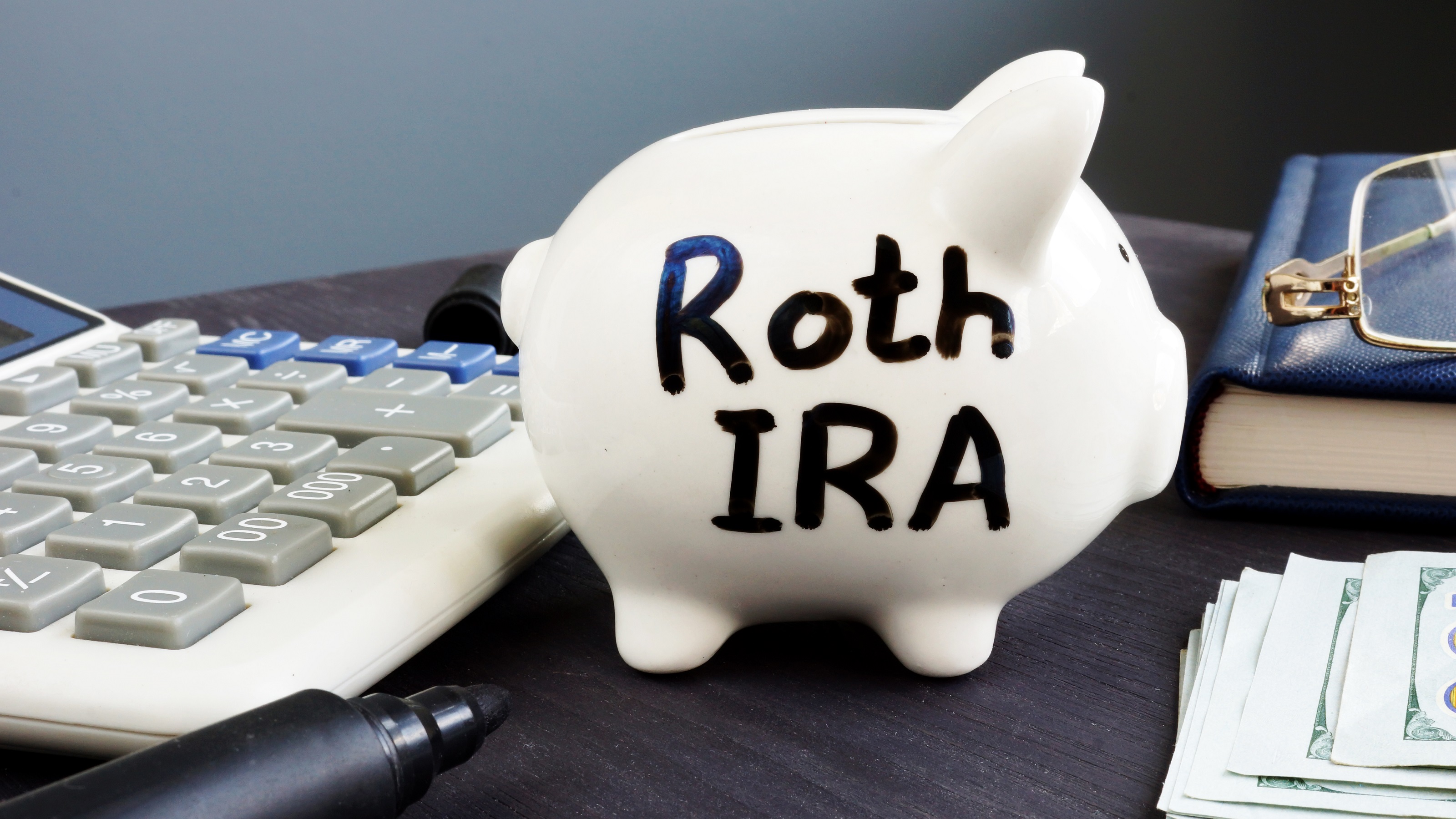Are Roth IRAs Really as Great as They’re Cracked Up to Be?
While a Roth IRA is an excellent tax strategy, that doesn’t mean you should underestimate the benefits of a traditional tax-deferred retirement account.


Profit and prosper with the best of Kiplinger's advice on investing, taxes, retirement, personal finance and much more. Delivered daily. Enter your email in the box and click Sign Me Up.
You are now subscribed
Your newsletter sign-up was successful
Want to add more newsletters?

Delivered daily
Kiplinger Today
Profit and prosper with the best of Kiplinger's advice on investing, taxes, retirement, personal finance and much more delivered daily. Smart money moves start here.

Sent five days a week
Kiplinger A Step Ahead
Get practical help to make better financial decisions in your everyday life, from spending to savings on top deals.

Delivered daily
Kiplinger Closing Bell
Get today's biggest financial and investing headlines delivered to your inbox every day the U.S. stock market is open.

Sent twice a week
Kiplinger Adviser Intel
Financial pros across the country share best practices and fresh tactics to preserve and grow your wealth.

Delivered weekly
Kiplinger Tax Tips
Trim your federal and state tax bills with practical tax-planning and tax-cutting strategies.

Sent twice a week
Kiplinger Retirement Tips
Your twice-a-week guide to planning and enjoying a financially secure and richly rewarding retirement

Sent bimonthly.
Kiplinger Adviser Angle
Insights for advisers, wealth managers and other financial professionals.

Sent twice a week
Kiplinger Investing Weekly
Your twice-a-week roundup of promising stocks, funds, companies and industries you should consider, ones you should avoid, and why.

Sent weekly for six weeks
Kiplinger Invest for Retirement
Your step-by-step six-part series on how to invest for retirement, from devising a successful strategy to exactly which investments to choose.
Have you ever heard or read anything negative about Roth IRAs?
I doubt it. The people in charge of the Roth’s public relations should get their industry’s highest honor for building up its reputation as every retirement saver’s absolute must-have.
In reality, the Roth is just another tax strategy with pros and cons like all the others. If you choose to save your retirement dollars in a Roth IRA or Roth 401(k) instead of a traditional IRA or 401(k), you will be giving up some tax breaks. It could even turn out that a traditional IRA or 401(k) would have been a better option for you.
From just $107.88 $24.99 for Kiplinger Personal Finance
Become a smarter, better informed investor. Subscribe from just $107.88 $24.99, plus get up to 4 Special Issues

Sign up for Kiplinger’s Free Newsletters
Profit and prosper with the best of expert advice on investing, taxes, retirement, personal finance and more - straight to your e-mail.
Profit and prosper with the best of expert advice - straight to your e-mail.
Before you read further, though, let me be clear: I love Roth IRAs — and I feel the ultimate financial goal in retirement should be to have as much money in a Roth IRA as makes sense for you.
Why? Because I think taxes of all kinds are going to go up. Way up. When that happens, you’re going to need every tax break you can get — and the Roth IRA is a great one. That doesn’t mean, though, that you should blindly save in a Roth and underestimate the benefits of a traditional tax-deferred retirement account.
What are the differences between a traditional IRA, or 401(k), and Roth IRA, or Roth 401(k)?
Different Tax Treatment of Roth and Traditional Accounts
Both are what I like to refer to as “tax wrappers.” Your choice to go with a traditional or Roth account, or both, will have nothing to do with the actual investments inside the account. You can hold almost anything available in the investment world in either one (although the investment choices in your workplace plan may be limited). The difference is in the tax treatment you’ll receive based on the type of account — or “wrapper” — you choose.
Want to save on taxes today? When you contribute new money to a traditional IRA or 401(k), you get a tax deduction that tax year, and the money grows tax-deferred until it's withdrawn sometime in the future.
So, for example, if you made $100,000 in a tax year and decided to contribute $15,000 to a traditional 401(k), you would have to pay income tax that year only on the remaining $85,000, not the full $100,000. That’s the up-front income tax benefit of a traditional IRA or 401(k). You also won’t have to pay any taxes on your money through the years as it grows and compounds.
However, the tax man will come to call eventually — when you decide to withdraw your money. Your entire account balance is taxable, and each withdrawal will be taxed as ordinary income in the tax year you take it. There’s no avoiding this reality. You can put it off for several years, if you like, but when you turn 73 (or 75 if you were born in 1960 or later), the IRS mandates that you take taxable withdrawals called required minimum distributions (RMDs).
The taxes won’t go away if you die either. Your beneficiaries will have to pay them, and possibly at a much higher rate compared to what you would have paid.
A Roth account shifts the tax breaks. There are no up-front tax deductions allowed on Roth contributions, so unlike the traditional IRA, there’s no tax benefit on day one. Instead, with the Roth, the big benefit comes down the road, when you decide to withdraw funds. All of your gains have the ability to be withdrawn free from any federal income tax.
There’s a five-year waiting period on this benefit, so if you haven’t opened your first Roth account yet, it might make sense to open one now (if you’re eligible) with a small amount of money to start your clock.
Another plus: There are no RMDs in your lifetime on a Roth. Because it’s not taxable, the government doesn’t care if you ever take the money out. And, upon your death, the entire Roth passes to your beneficiaries free from federal income tax.
Digging a Little Deeper into Roth IRAs
So, the Roth sounds pretty darn good, doesn’t it? Well, it is … but let’s dig a little deeper.
Though Roths are often labeled as “tax-free,” I disagree with that description. When you save money in a Roth, you are contributing after-tax money. You aren’t expected to pay taxes on your withdrawals because you already paid taxes on those dollars. I don’t call that “tax-free.”
What does come out tax-free later are any gains you’ve made. And that’s a huge benefit. But I believe a better description for Roths would be “partially tax-free.”
Here’s something else to think about. What if it turned out that you didn’t have to pay taxes on your traditional IRA withdrawals after all? If that was possible, and you’d saved 100% of your money in a Roth over the years, you would have missed out on all the tax deductions you would have gotten on your contributions.
And it might be possible, these days, using the larger standard deduction that all Americans get on their tax return. The 2023 standard deduction for a single filer over 65 is $15,350, and $30,700 for a married couple filing jointly. That means the first $15,350 or $30,700 of income on your tax return is tax-free. Even for a retiree facing an RMD, the standard deduction might wipe out any tax due.
Now, there are other factors to consider, for sure, like the taxable income coming in from pensions, Social Security, interest and dividends, and other sources. Those are the elements that could cause you to really need that Roth account. Plus, the taxes your beneficiaries might have to pay if they inherit your account still need to be considered.
This is where retirement planning can come in handy. A CPA or financial adviser with tax expertise can help forecast what your probable retirement income and tax situation will be and help you gain insight into what would be the best move for you and your family.
You don’t have to wait until you’re on the cusp of retirement to run the numbers and make a decision. Actually, the sooner you make that decision, the better off you’ll be.
Kim Franke-Folstad contributed to this article.
The appearances in Kiplinger were obtained through a PR program. The columnist received assistance from a public relations firm in preparing this piece for submission to Kiplinger.com. Kiplinger was not compensated in any way.
Profit and prosper with the best of Kiplinger's advice on investing, taxes, retirement, personal finance and much more. Delivered daily. Enter your email in the box and click Sign Me Up.

Edward F. Downey has been in financial services since 1992 and is the president of Downey Financial Group, an independent financial planning firm in Bartlett, Ill. He is a Registered Investment Adviser and author of Retirement Blueprint: The First Steps to Building a Better Lifestyle in Retirement. Ed’s goal is to protect families from extreme market downturns and over-taxation by providing sound retirement income and tax planning.
-
 The New Reality for Entertainment
The New Reality for EntertainmentThe Kiplinger Letter The entertainment industry is shifting as movie and TV companies face fierce competition, fight for attention and cope with artificial intelligence.
-
 Stocks Sink With Alphabet, Bitcoin: Stock Market Today
Stocks Sink With Alphabet, Bitcoin: Stock Market TodayA dismal round of jobs data did little to lift sentiment on Thursday.
-
 Betting on Super Bowl 2026? New IRS Tax Changes Could Cost You
Betting on Super Bowl 2026? New IRS Tax Changes Could Cost YouTaxable Income When Super Bowl LX hype fades, some fans may be surprised to learn that sports betting tax rules have shifted.
-
 The 4 Estate Planning Documents Every High-Net-Worth Family Needs (Not Just a Will)
The 4 Estate Planning Documents Every High-Net-Worth Family Needs (Not Just a Will)The key to successful estate planning for HNW families isn't just drafting these four documents, but ensuring they're current and immediately accessible.
-
 Love and Legacy: What Couples Rarely Talk About (But Should)
Love and Legacy: What Couples Rarely Talk About (But Should)Couples who talk openly about finances, including estate planning, are more likely to head into retirement joyfully. How can you get the conversation going?
-
 How to Get the Fair Value for Your Shares When You Are in the Minority Vote on a Sale of Substantially All Corporate Assets
How to Get the Fair Value for Your Shares When You Are in the Minority Vote on a Sale of Substantially All Corporate AssetsWhen a sale of substantially all corporate assets is approved by majority vote, shareholders on the losing side of the vote should understand their rights.
-
 How to Add a Pet Trust to Your Estate Plan: Don't Leave Your Best Friend to Chance
How to Add a Pet Trust to Your Estate Plan: Don't Leave Your Best Friend to ChanceAdding a pet trust to your estate plan can ensure your pets are properly looked after when you're no longer able to care for them. This is how to go about it.
-
 Want to Avoid Leaving Chaos in Your Wake? Don't Leave Behind an Outdated Estate Plan
Want to Avoid Leaving Chaos in Your Wake? Don't Leave Behind an Outdated Estate PlanAn outdated or incomplete estate plan could cause confusion for those handling your affairs at a difficult time. This guide highlights what to update and when.
-
 I'm a Financial Adviser: This Is Why I Became an Advocate for Fee-Only Financial Advice
I'm a Financial Adviser: This Is Why I Became an Advocate for Fee-Only Financial AdviceCan financial advisers who earn commissions on product sales give clients the best advice? For one professional, changing track was the clear choice.
-
 I Met With 100-Plus Advisers to Develop This Road Map for Adopting AI
I Met With 100-Plus Advisers to Develop This Road Map for Adopting AIFor financial advisers eager to embrace AI but unsure where to start, this road map will help you integrate the right tools and safeguards into your work.
-
 The Referral Revolution: How to Grow Your Business With Trust
The Referral Revolution: How to Grow Your Business With TrustYou can attract ideal clients by focusing on value and leveraging your current relationships to create a referral-based practice.